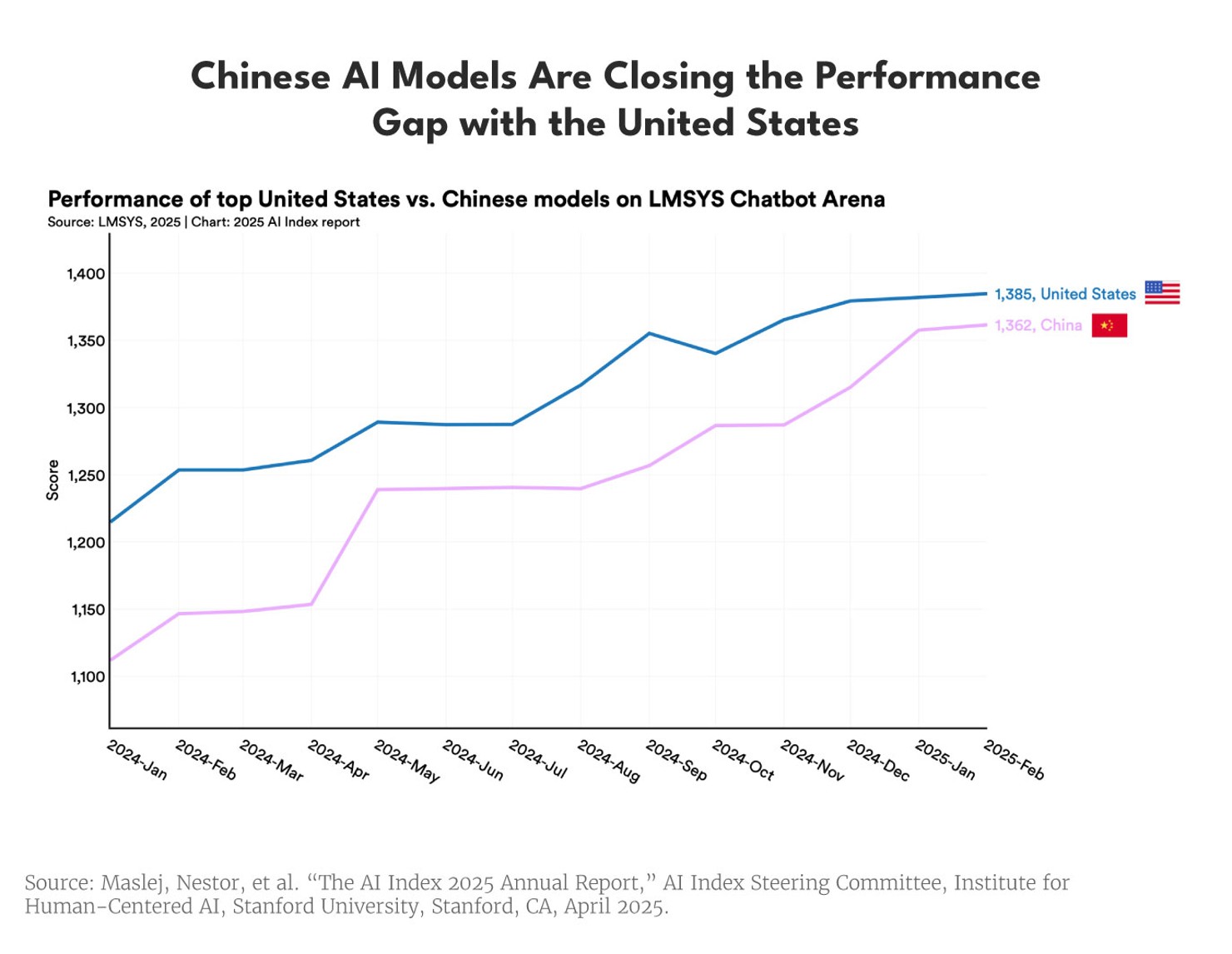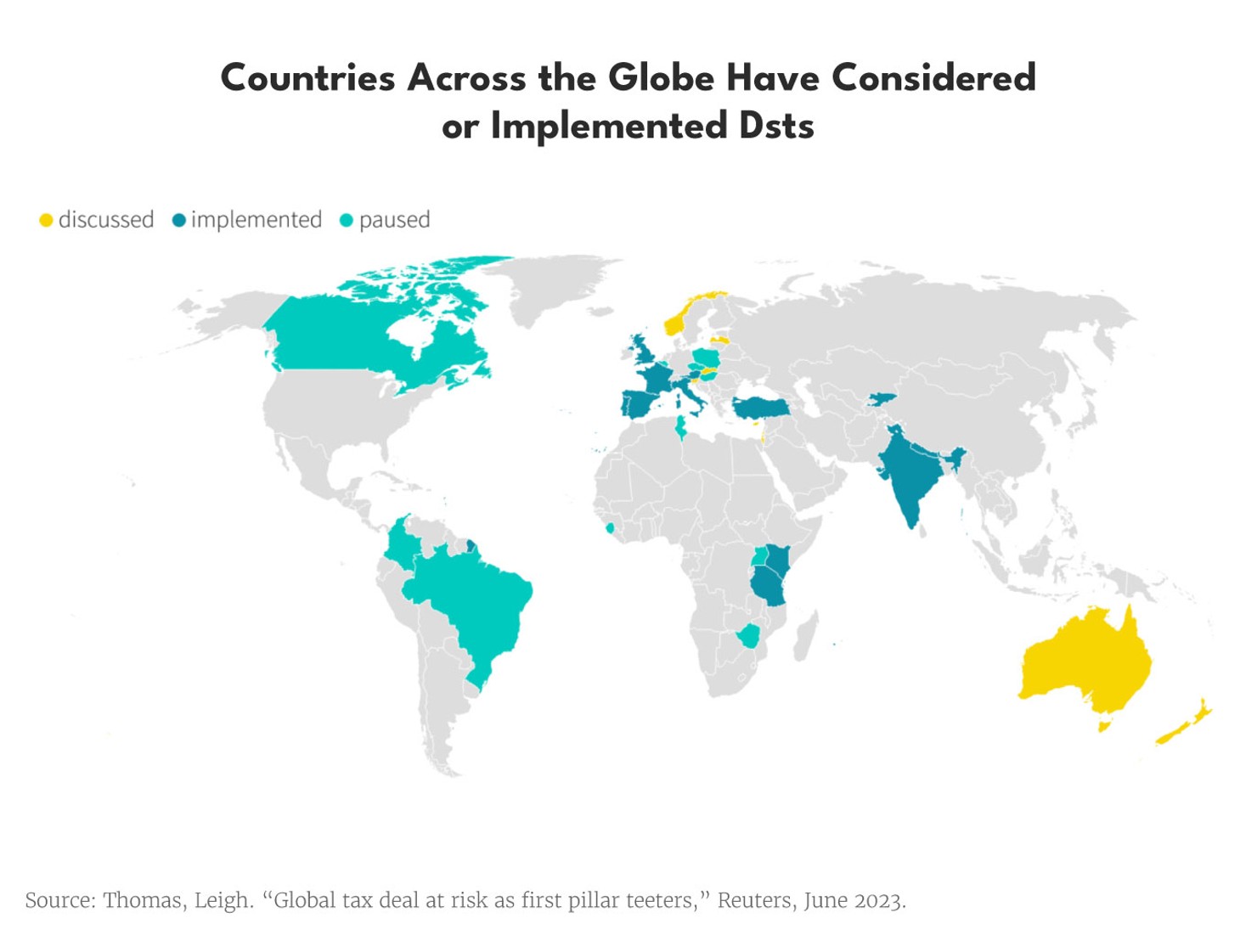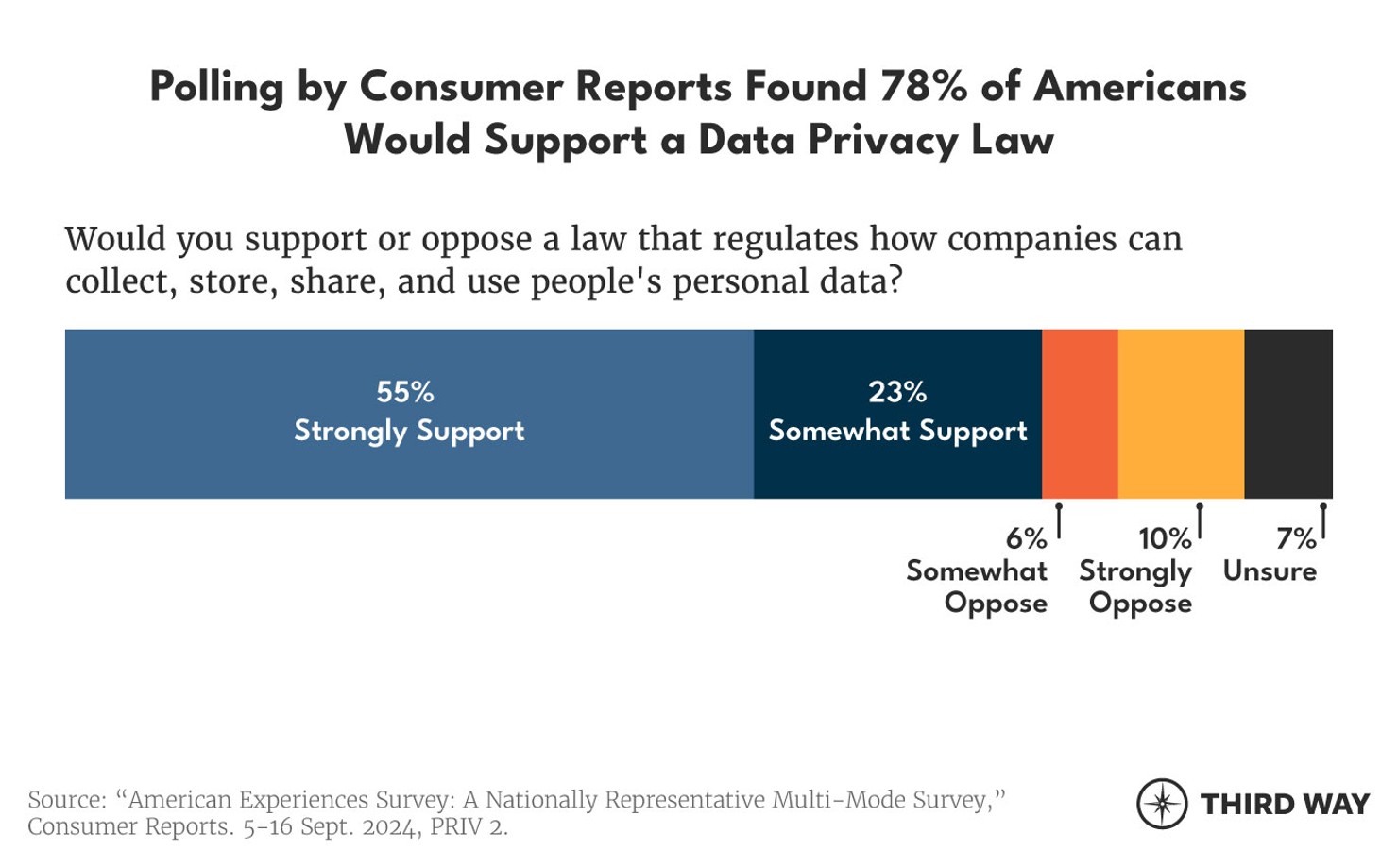Memo Published November 14, 2025 · 9 minute read
The Future of Tech: 5 Questions for Democrats
Ruth Whittaker

Let’s face it: sitting on your hands isn’t an effective way to govern. Fixating on risks and letting opportunities slip away isn’t smart either.
Technology—from AI to zero-emission vehicles—has the potential to radically transform our economy, health, education, national security, and daily lives. At the same time, its disruption can also create societal challenges that cannot be disregarded. And yet, years of discussion in Congress has resulted in very little in the way of modern regulation. The United States remains one of the only developed, digital economies without a comprehensive privacy standard. There are still no modern rules for the treatment of children online. There is no to-scale vision for how to harness the opportunity around artificial intelligence.
Meanwhile, other countries have rocketed ahead. The European Union has been active in regulating tech products and services. Countries throughout the globe have levied digital service taxes on US companies. China has mobilized its vast state apparatus in support of innovation, manufacturing, and international ties. As a result, American companies are being regulated by foreign governments and competing with highly subsidized foreign rivals.
We’ve been blunt in the past, and the sentiment still stands today: Democrats need a positive and modern vision on technology policy. Without one, they risk ceding the entire regulatory agenda to Republicans and sacrificing progress on environmental protections, consumer welfare, and corporate oversight. They also risk missing a generational opportunity to harness new technology in service of progressive priorities.
We recommend Democrats start with these five questions to guide their agenda.
1. How Do We Win the AI Race without Sacrificing American Values?
We’re bullish on AI and see expansive opportunities for economic growth, accelerated scientific breakthroughs, innovations in education, and more. It’s no wonder that China has thrown the weight of its state apparatus behind artificial intelligence developers with the goal of becoming the global leader by 2030.1 If Chinese products come to dominate the market, however, not only will the United States lose out on massive economic opportunities, US consumers will also be subject to Chinese principles on privacy and consumer protection. Widespread adoption of Chinese AI systems would also enrich the Chinese government with troves of sensitive data from users who would have no control or visibility into how it was used.

It's a national imperative to win the AI race and support American interests on the front lines of this battle. Yet, the race to beat China on AI cannot become a race to the bottom when it comes to other things Democrats value. Innovation must be supported but so too should consumer protection, jobs, and environmental standards.
Republicans’ proposed “light touch” framework attempts to insulate artificial intelligence developers from any regulatory scrutiny while also injecting cultural grievances into development principles.2 Democrats should push back with their own forward-thinking framework that supports innovators and also provides consumers and regulators with transparency as to how systems are developed and what guardrails are in place. Democrats must also ensure that the benefits of AI are distributed broadly—geographically and demographically—and that costs are equitably distributed.
2. How Can We Promote Competition and Keep Costs Down for Consumers?
Antitrust enforcement is an important tool when it comes to reining in market distortions and harmful conduct by powerful companies. As recent litigation has shown, the existing antitrust framework is still being used effectively to address conduct across a range of industries.3
The problem is that some loud voices in both parties have tried to weaponize this tool against companies in certain sectors or above a certain size. But big doesn’t necessarily mean bad, and demonizing companies doesn’t necessarily address rising prices. Remember: the cost of essential items like food and housing remain voters’ top concern.4 If a company is price gouging or using predatory pricing, then use the law to stop that behavior. But vast numbers of companies are not necessarily doing that. Large companies do have more resources to invest in research and development and can pursue projects that might not be immediately profitable but will unleash innovation in the long run. The benefit of consumer welfare-focused antitrust enforcement is that it considers the risks posed by excessive consolidation with the potential benefits for consumers.
Democrats should focus less on reforming antitrust enforcement and using it as a tool against one industry. Instead, they should find ways to strengthen the existing tools enforcers have and prioritize conduct that drives up prices for consumers.
3. When Should the United States Push Back on International Overreach?
The European Union and other countries have aggressively pursued regulation of the tech sector, some of which has a sizeable impact on American firms and consumers. For example, digital services taxes (DSTs) have become a popular tool that foreign governments use to reap some of the benefits of American innovation. These taxes generally apply to gross revenues from a variety of digital services like advertising, data usage, and video streaming or downloads.5 Most DSTs have been structured to apply only to the largest digital service companies, which are most often headquartered in the United States.6

Because they tend to be narrowly tailored to apply only to American firms, lawmakers on both sides of the aisle have argued that DSTs are discriminatory and have urged recent administrations to push back against them.7 For example, in 2024, the Canadian Parliament passed a bill that would have imposed a 3% tax on social media services, online marketplaces, and online advertisers.8 The Biden Administration and the Trump Administration put pressure on the Canadian government to abandon the plan, but only after President Trump threatened to suspend trade talks did Canada agree to rescind the law.9
Democrats should commit to using all available diplomatic tools to push back against regulations that unfairly target US firms and could be detrimental to American innovation. However, not every foreign regulation requires a muscular response. Pressure should be applied with broader strategic objectives in mind. As Rep. Sam Liccardo (D-CA) points out, “we can aggressively battle unnecessary regulation from Europe without alienating the entire continent with tariffs.”10
4. What Safety Standards Are Necessary to Protect Children?
The dangers of social media for children are well-documented. However, the regulatory responses to those dangers have fallen short. Effective child safety policies must balance protecting kids while also giving them the space to learn to be responsible users of technology.
Previous attempts to protect kids online have failed to surmount legal and technological hurdles and have ignored realities of how children interact online. For example, proposals to simply ban or restrict kids’ access to social media were technologically infeasible and prompted outcry. Policies that require platforms to distinguish children from adults face major technological challenges, as even the most advanced age verification technologies can still result in errors or be circumvented by VPNs.11 Children’s advocates have also rightly criticized those proposals for limiting children’s access to information without addressing the root causes of harm.12
Similarly, efforts to control what kids see online raise fairness and First Amendment concerns. Kids’ experiences differ, and rules requiring platforms to block certain content have faced opposition from civil liberties groups. Courts have raised similar concerns—the Ninth Circuit Court of Appeals said a California law likely violates the First Amendment by requiring companies to “opine on and mitigate the risk that children may be exposed to harmful […] materials online.”13
Given these challenges, Democrats should focus on identifying the biggest threats to child users and develop targeted policies to address them. An effective child safety framework should impose stricter guardrails on how platforms treat children without sacrificing children’s access to information or beneficial tools. One starting point could be requiring greater transparency from platforms so that independent researchers can study the threats to child users and evaluate potential solutions.
5. When Will the United States Protect Americans’ Data?
The answer should be “immediately.” The closest we have gotten to passing a bipartisan comprehensive framework was in 2022, when the American Data Privacy and Protection Act (ADPPA) was voted out of the House Energy and Commerce Committee with only two dissenters.14 Unfortunately, it stalled on the floor and its Senate companion failed to make it out of committee. In the meantime, states and other countries have continued to adopt their own rules.
User data has only become more valuable since then—especially with the release of AI models that train on troves of user data. Consumers should have ultimate control over their personal data. But without universal standards in place, the only way for consumers to know what happens to their data is to sift through the privacy policies of every website they visit or app they download. Users may allow access their most sensitive data, including their exact location, health information, and financial details, without understanding how it’s stored or whether it’s sold to third parties. While the internet doesn’t stop at state borders, current rules governing the treatment of data do, compounding the confusion for consumers trying to protect themselves and businesses trying to compete nationwide.
Democrats must push forward on a comprehensive privacy framework that would give every American the same opportunities to control their data and eliminate the patchwork that hurts consumers and businesses alike. A 2024 poll found that 78% of Americans would support a federal privacy law.15 A separate poll from the same year found that 61% had learned that their personal data had been compromised at least once.16 The risks of inaction will only continue to grow, and progress on other tech initiatives will be stunted without a privacy framework as a foundation.

A Robust Tech Agenda Will Help Democrats Win
Previous Democratic leaders built the party’s forward-thinking reputation by embracing technology. The Clinton Administration saw the internet as a vehicle for broad-based economic growth, and they adopted an agenda that promoted American innovation and expanded access to new technology.17 President Obama embraced social media not just as a revolutionary campaign tool but also as an invitation to make government more accessible and transparent.18
In recent years, Democrats have justifiably called out the missteps of the industry and identified the need for stricter guardrails. But those guardrails should not end up being closed gates. Instead, we should seize the opportunity to put new technologies to work in pursuit of Democratic objectives. Artificial intelligence can help make government programs more effective and drive faster research into green energy sources. The economic growth it could unleash could drive more investments in education, child care, and health care. The jobs created in the future could become the new pathways to the middle class.
The speed of technological innovation is thrilling and terrifying. Democrats need a vision to assure voters that they will reap the benefits of the tech industry’s growth.
